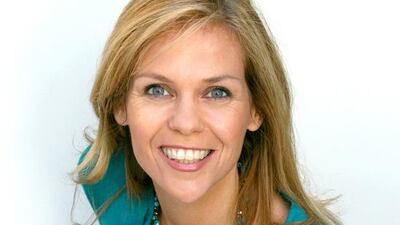A recent guest at of this year’s Emirates Airline Festival of Literature in Dubai, Best-selling British author Adele Parks describes her regular visits to the UAE during the early 90s, pre-boom period, as memorable.
“My parents used to live here in Dubai way back when,” says Parks, who was a guest at the Emirates Airline Festival of Literature that was held in Dubai in March. “My father, who is now retired, was in the construction business here and I would come over to see him. The last time I visited here was two years ago and that was after 18 years, and the transformation that I saw was amazing.
“What I like about the country is that not everything is done for the sake of it. I am a big fan of modern architecture and you can definitely see that lots of thought goes into some of the wonderful building designs.”
Parks's reflections on the past have played a role in her creative process. Her new novel, If You Go Away, marks her second consecutive work of historical fiction, after last year's well- received Spare Brides.
Set in 1914 in an England that was at the brink of the First World War, the novel follows young Vivian who marries a traditionalist. Using the war as an excuse to escape their unhappy marital life, Vivian’s husband enlists in the army and travels abroad. Meanwhile, Vivian is left to take over the managing of the estate and strikes a relationship with the photographer and conscientious objector Howard.
While Parks can't say whether Spare Brides and If You Go Away mark a permanent shift to historical fiction, she credits the genre for challenging people's perceptions of her work.
“I was in this rather comfortable position where I wrote 13 contemporary novels, and I have been lucky in they were all well received,” she says.
“But it can also be a double-edged sword, because people began to think that contemporary fiction is what I do and so I should continue doing that. Meanwhile, I wanted to move on to a bigger canvas.”
Parks says there are plenty of her signature elements in her new work to satisfy long-term fans.
“There are still stories about women and women’s issues,” she says. “Whether it is now or 100 years ago, I believe that many of these issues are the same. The ambitions, hopes and dreams are surprisingly similar and are shared across different cultures. So I knew I could write these books, but they just needed a lot of research.”
From a father who abandons his family in 2001's Game Over, to a woman yearning for a child in 2009's Tell Me Something, Parks's characters often have to make heart-wrenching decisions.
“I think I do have a strong moral compass,” she says. “So while my characters are often flawed and experience some trauma, I always try to make them go on a journey where they discover their weaknesses, work on themselves and put things right.”
With such universal themes running through her work, it is understandable that Parks bristles when her work is defined as chick-lit.
A proud feminist, she says the label often targets women authors as opposed to topics discussed in the novel.
She cites fellow British author David Nicholls as an example: “Nobody calls his books that, although it is absolutely in my category,” she says.
"When David wrote One Day, he sent his book to me and others like Marian Keyes and Jojo Moyes for an endorsement quote – which I happily did because it is a great book – because he knew that was his market. I think now people are getting more sensitive to it and asking perhaps to call such books contemporary women's fiction or, simply, contemporary fiction."
As for Parks’s books, perhaps it best to ditch reading physical copies. It is through Kindle, says the author, that her work has been able to cross the gender divide.
"With Kindle I have so many more readers because they are not embarrassed by the cover," she says. "I think men would struggle with some titles and the covers of my books – such as Men I've Loved Before – to sit on the train and read it. With Kindle they have no problem at all because there is no cover and it is discreet."


